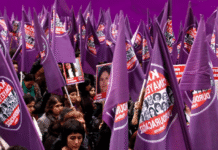Hülya Atçı Nergis, a deputy from the ruling Justice and Development Party (AKP), said in a controversial remark that women also bear some guilt for male violence, Turkish media reported.
“Women raise the men who eventually go on to kill other women,” she said on a local television program. “Men are the ones who are always blamed, but in this regard, don’t women have any fault?” she said. Nergis had also said in early March that more men were killed than women.
Nergis added that the feminist movement in Turkey was “disturbing” and that everyone was speaking with the same feminist concepts. “I have broken the taboo with regards to the feminist language,” she said. “Although I have received criticism, I am telling the truth, and the disadvantaging of men in these matters disturbs me.”
On International Women’s Day Nergis raised eyebrows when she said 12 times more men were killed than women. She claimed that the media had blown domestic violence and femicide cases out of proportion, which had created a false perception in society.
“The opposition is also feeding into this perception,” said Nergis. “I don’t get the big deal, there are so many murders happening in the world.”
Emphasizing that Nergis’ comparison of femicide with the number of men killed each year did not make sense, women’s activists said the real culprits behind femicide were authorities and government officials who failed to protect women.
Some associations pointed out on social media that withdrawing from the Istanbul Convention was only one example of how the state had left women vulnerable.
The 2011 Istanbul Convention, the Council of Europe’s (CoE) binding treaty to prevent and combat violence against women, was signed by 45 countries and the European Union, of which Turkey was the first, requires governments to adopt legislation prosecuting perpetrators of domestic violence and similar abuse as well as marital rape and female genital mutilation.
In a controversial move Turkish President Recep Tayyip Erdoğan withdrew Turkey from the Istanbul Convention on March 20 with an executive decree.
Even before Turkey withdrew from the convention, the track record of women’s right and violence against women was dismal. According to a report published earlier by Sezgin Tanrıkulu, a human rights defender and deputy from the Republican People’s Party (CHP), nearly 7,000 women have been victims of femicide during the 18 years that the Justice and Development Party (AKP) has been in power.
Activist have argued that these numbers are an underestimation since many cases of femicide are registered as suicide or “suspicious death.”
The report said one of the main reasons for the increase in deaths was because women were not taken seriously by law enforcement when they complained about violence. “Women go to the police and file a complaint against their partners after a violent incident,” said the report. “However, instead of taking the necessary legal steps against the perpetrators, the authorities act as conciliators and try to reconcile the partners.”
In one shocking case, the victim had filed 23 complaints against her violent partner but was eventually murdered as none of her complaints were taken seriously by the authorities.
Ayse Tuba Aslan was murdered in 2019 after repeatedly seeking help. Her family has blamed her murder on the institutions that failed to protect her. They have filed a complaint against the Ministry of Justice, the Ministry of the Interior and the Ministry for Family, Labor and Social Services.
The three ministries testified in court but denied any responsibility in Aslan’s death. Although the victim sought help from law enforcement, she was neither provided with protection nor was her husband detained.
In her last petition, which was discovered in her purse after her death, Aslan had said, “Will you protect me after my death?”
Activists have demanded that the officers who failed to take action Aslan’s husband be investigated for negligence.
















[…] Erdogan’s ruling AKP party, used last year’s International Women’s Day to complain that women should also bear responsibility for the fact that men kill women. “Men are […]